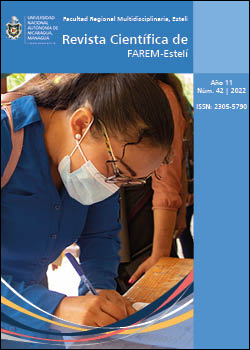Gastronomic Route of the Cayambe canton, province of Pichincha, based on its territorial potential. Ecuador
DOI:
https://doi.org/10.5377/farem.v11i42.14684Keywords:
Cayambe, potentialities, gastronomic route, turismAbstract
This research is based on the design of a gastronomic route of the Cayambe canton, province of Pichincha, Ecuador, based on the territorial potentialities present in the locality from the environmental, gastronomic and touristic point of view. In addition, the epistemological route that sustains the research was analyzed from the introspective experiential approach, through the grounded theory as a qualitative method for the generation of the design of this route, as well as establishing the techniques and instrument with which the information was collected through the application of the open, axial, and selective coding to achieve the objectives mentioned above, it was based on the theoretical contributions of Paz Sandin (2003), Glaser and Strauss (1967), Strauss and Corbin (1996). The objective of the research was to design a gastronomic route based on the territorial potentialities present in the Cayambe canton. As a result of the selected coding seven categories emerged in which the territorial potentialities such as food resources, economic, environmental, geographic, culinary, ethnic, sustainable, tourism, and intangible heritage and so through these emerge the gastronomic route and the three study zones that are part of the Cayambe Canton as a new alternative for territorial planning of gastronomic.
Downloads
References
Cayambe, G. (2019). Plan de desarrollo y ordenamiento territorial. Cayambe: GADIP.
Corbin, J., & Strauss, A. (1996). Analytic ordering for theoretical purpose. Qualitative Inquiry, 139-150.
Creswell, J. (1998). Qualitative Inquiry and Research Desing. Choosing Among Five. London: Thousand Oaks. Sage Publications.
Franco-Mass, D., Osorio , G., Nava, B., & Regil, G. (2009). Evolución multicreterio de los recursos turísticos. Estudios y pewrspectivas del Turismo, 208-216.
Getz, D. (2008). Event tourism: Definition, evolution ande Research. Progress in Tourism managment, 403-428.
Glaser, B., & Strauss, A. (1967). The discovery of grounded theory. Chicago: Aldine Press.
Horton, D. (2008). Facilitating pro-poor market chain. innovation: An assessment of the participatory market chain approach in Uganda. Lima: International Potato Center.
INEC. (2021). INEC. Recuperado el 17 de 03 de 2022, de https://www.ecuadorencifras.gob.ec/estadisticas/
Montesinos, A. (2016). Planificación del turismo gastronómico sostenible: Servicios, rutas, productos y destinos. México D.F.: CEHAGO.
Romero, J. F. (2018). La gastronomía como atractivo turistico en el centro histórico de Quito. Innova Research Journal, 194-203.
Romero, J. F. (2021). Configuraciones del desarrollo endógeno en el contexto rural. Qualitas, 1-14.
Sandín, M. P. (2003). Investigación cualitativa en eduacación. Fundamentos y tradicones. Madrid: Mc Graw and Hill Interamericana.
UNWTO. (2021). Guía para el desarrollo del turismo gastronómico. Barcelona: Basque Culinary.
Zamorano, F. (2002). Turismo alternativo. Servicios turísticos diferenciados. México: Trillas.
Zeinab, J. (2016). Rutas Gastronómicas y Desarrollo local: un ensayo de conceptualización en Cataluña. PASOS. Revista de Turismo y Patrimonio Cultural, 1190.
Published
Issue
Section
License
Copyright (c) 2022 Revista Científica de FAREM-Esteli

This work is licensed under a Creative Commons Attribution-NonCommercial-ShareAlike 4.0 International License.



